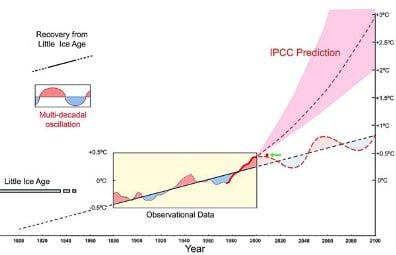This article is more than 1 year old
Bishop Hill: Gonzo science and the Hockey Stick
Torturing the climate numbers until they confess
This is the famous 'Upside Down Mann'
His mathematical algorithm couldn't detect the fact it was upside down. It just said 'look there's a deviation from the normal in the 20th Century, that seems to match the Hockey Stick, therefore I have something that can predict temperature. It's rather ludicrous and has been picked up by people involved in lake sediment research and they said he's got it wrong.
Mann has never acknowledged it, and it's still in the literature. It will be quite interesting to see if these papers end up in the fifth IPCC assessment report, because that's the state of play.
You don't decide what you want at the end, then choose the data and methodology that gives you the 'right answer'.
It's quite emblematic of how climate science has been conducted over the past ten years. The Upside Down Data is fine anyway, we're told, because we all know it's getting warmer; it's fine to use upside data, because the data fits. It's blessed as an OK thing to do.
What amazed me in your account is the testimony by one climatologist, D'Arrigo, who told the Senate that cherry-picking is OK, that if you get "a good climatic story" (her words) from the data, then you can throw away the data that doesn't suit the results. Torture the numbers until they confess, you call it.
It's one of those things where you do a double take and ask yourself 'did she really mean to say that?'. And perhaps there is some explanation for what she said and we've all got the wrong end of the stick, but as it was reported, yes, she said cherry picking was acceptable. There are other people working in the same area who have said the same thing.
One paleoclimatologist called Jan Esper has said you can throw away the bits that don't give you the right answer - and it's an advantage 'unique to climatalogy'. Yes, they say it, and seem to believe it.
This isn't science, is it?
No, it isn't science. This is something Edward Wegman, the statistician who did a report into the science said - it's not science. The cardinal rule is you decide your methodology and data, and see what comes out at the end. You don't decide what you want at the end, then choose the data and methodology that gives you the 'right answer'.
Where does this leave the science? We've heard the science is sound, but as people look closer and closer they begin to question what that means. The 'science' appears to be theoretical. There's a theory that greenhouse gas emissions have feedback, multiplier effects, but it is just a theory.
My book concentrates on just one area of the science and finds the science is highly questionable. More importantly I think, it finds the processes and procedures are corrupt, and they're biased. And this is borne out by what we see in the Climategate emails.
So if you stand back from it for a while and look at the big picture, you have this theory, and have a lot of biased and corrupt science you like, that says yes, the theory is true. The general public are going to look at that and say "Well, I don't want biased science to tell me it's true, I want unbiased science to tell me it's true".
Where do we go from here? I think we have to find a way where people who don't have vested interests in the result assess the science again. And I don't see how that can happen again under the auspices of the IPCC.
They seem to be corrupt from top to bottom. The whole process seems to be developed in order to refute sceptics, rather than get to the truth. They're not a body that exists to get to the truth. I think they've got to tear it down and start again.
Whether that's feasible, I don't know. The public may not wear it either way. I think public opinion is going to fall away quite quickly now.
The theory that CO2 will absorb heat is true, other things being equal. What we don't understand is that the other things are equal.
You can't see the science being conducted outside the IPCC, then? People forget it doesn't fund science, it doesn't fund original research, it's there to report on the research that's conducted. I'm not quite convinced of the argument that if we get rid of the IPCC the problem won't have got away - it'll be the same people at the same institutions looking for the same 'results'.
I think that's true. But if you have outside people writing the report, you might get a different answer. But whether that's feasible I don't know. The thing that struck me is the paleoclimate studies I've written about are mainly about statistics. But when a statistician looked at what had been done, he decided it was nonsense, it wasn't science, and it was biased.

